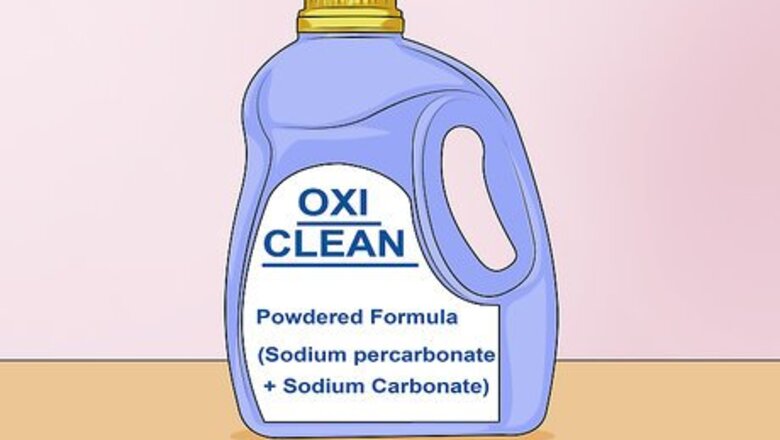
views
Using Oxygen Bleach
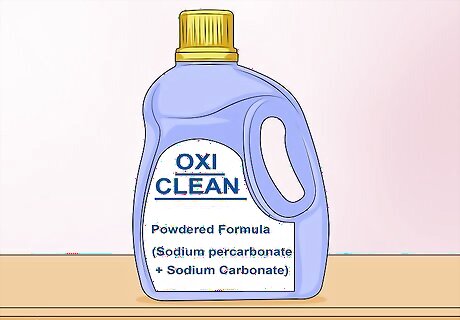
Purchase an oxygen bleach product. There are many to choose from, but OxiClean is probably the most easily recognized. The specific product you buy is your preference, but you should look for a powdered formula that contains sodium percarbonate and sodium carbonate. Other fillers will reduce the efficacy of the product. Some other recommended brands are Biokleen’s Oxygen Bleach Plus, Oxo-Brite (which is supposed to be earth-friendly), and Vaska’s Oxygen Brightener.
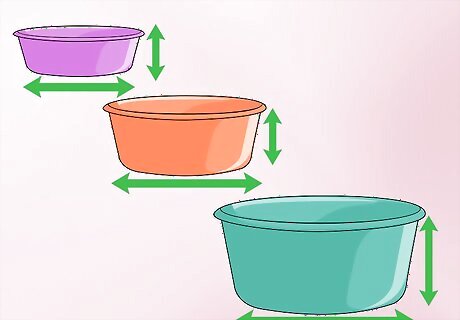
Find the right size container. You need a container than can fit the piece you need to clean, plus enough water for the piece to soak in. For small items, a sink or bucket works well. For something large like sheets or a comforter, you might need to find a clean trash can or large plastic tub. For large items that are only stained in one particular area, you could place it so only the affected area is soaking in the container.
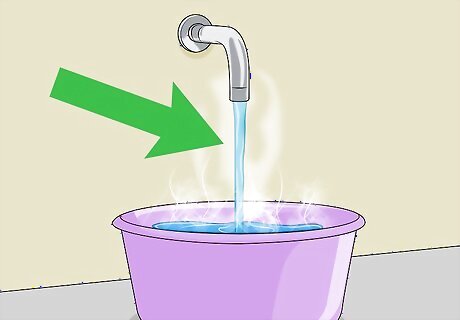
Fill the container with hot water. Although it is sometimes recommended that you use cold water to avoid setting the stain, oxygen bleach requires hot water to work. For most items, you’ll want enough water to fully submerge the piece in the water.
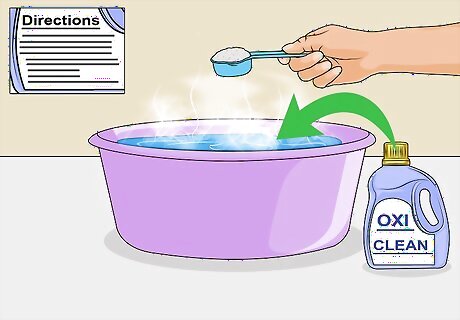
Add oxygen bleach as directed by product label. You want to follow the product use instructions because different products have different concentration levels. Following the label closely will ensure you use the right amount. Also, stir the bleach around to help it dissolve. The water should be cloudy and slightly grainy.
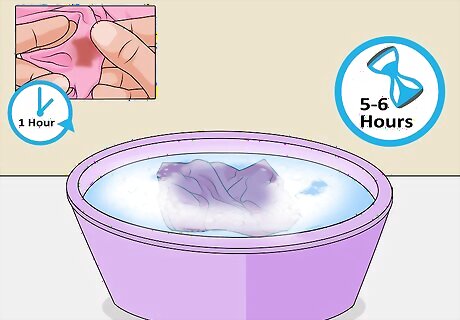
Soak the fabric. The length of time needed depends on the type of stain and how bad it is. You may only need to leave the piece soaking for 30 minutes or so. For best results, let the item soak for about 5-6 hours, as this is the length of time the oxygen bleach will stay active. Check the piece of fabric every hour to see how well the stain is fading. Occasionally stir the clothing around and try to mix up any oxygen bleach that has settled at the bottom. You can also add more hot water as it cools.
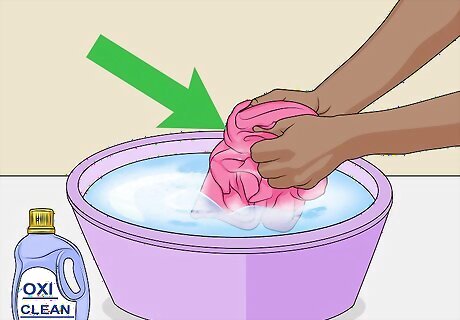
Wash the item. After the item has soaked and the stain seems to be mostly gone, wash the item as you regularly would. You can also add a little more oxygen bleach to the wash cycle to give it an extra boost. Always check the stain again before drying the item, as drying can set the stain worse if it is not yet removed. If the stain remains after the soak and wash, either repeat the process or try another stain removal method.
Treating Specific Common Stains
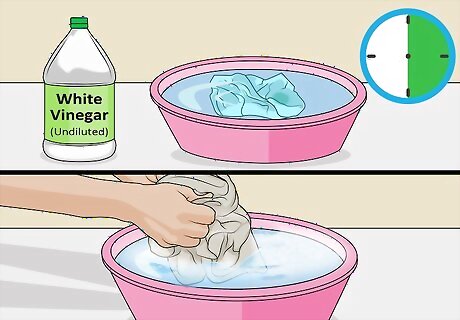
Remove grass stains with vinegar. Soak the stained portion of the fabric in undiluted white vinegar for 30 minutes. Depending on the size of the stain and the size of the garment, fill a large bowl or wash basin with enough vinegar to cover the stain and allow the fabric to soak. Then launder the garment as you usually would. If the stain remains after washing, do not dry it. Treat it again.
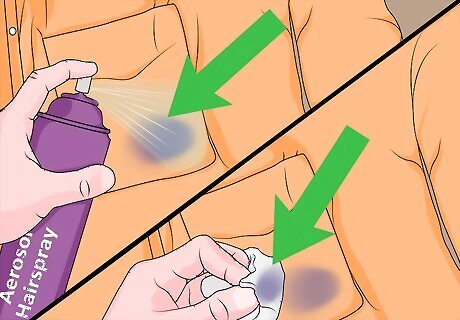
Remove ink stains with hairspray or hand sanitizer. Place a paper towel under the stained portion of the item. Spray a liberal amount of aerosol hairspray, or dab some sanitizer, on the stain. Lightly dab at the stain with another paper towel. The paper towel under the cloth is to keep the stain from soaking through to other portions. This can take some time depending on the amount of ink in the cloth, so repeat the process of spraying and/or dabbing until the ink is removed. Another option is to spray the stain with enough hairspray to soak it, and then wash as you regularly would.
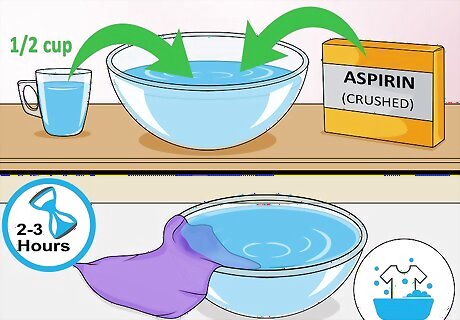
Remove sweat stains with crushed aspirin and water. Crush three uncoated aspirin with the back of a spoon and mix into ½ cup of room temperature water. Allow the stained fabric to soak in this mixture for 2-3 hours. Then wash the garment as you usually would.
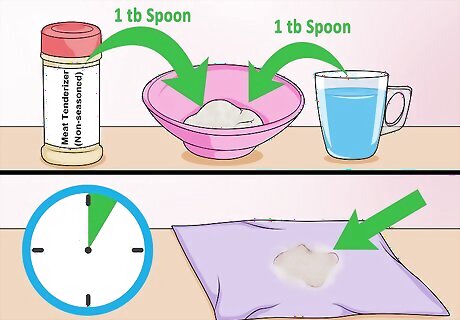
Remove blood stains with hydrogen peroxide or meat tenderizer. If you are trying to clean protein-based stains, especially blood, hydrogen peroxide and meat tenderizer are both great choices because they break down protein. Apply hydrogen peroxide or equal parts meat tenderizer and water to the stain and let it sit for several minutes. You can rinse the spot clean with water and if the stain remains, apply the hydrogen peroxide or meat tenderizer a second time and allow to sit for longer.
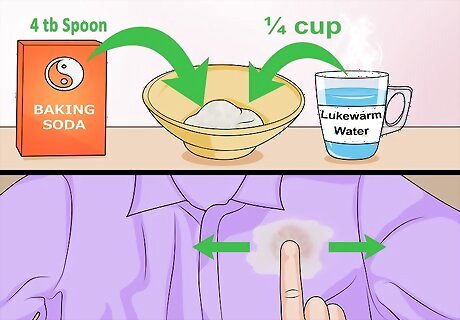
Mix baking soda and water. Combine four tablespoons of baking soda in ¼ cup of lukewarm water and mix into a paste. Apply this liberally to the stain and rub at it with your finger or a toothbrush. Let the paste sit for a while to work fully.
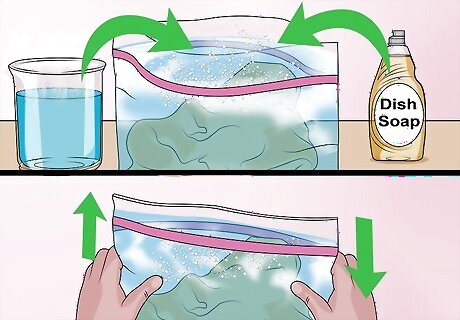
Use dish soap for grease stains. If you work in the automotive industry, you’re likely to get covered in grease daily. Standard detergent is not formulated to fight greasy stains, but dish soap is. Put the item in a gallon size zip bag, fill with hot water and squirt a liberal amount of dish soap in. Shake the bag for a while and then let it soak. You can repeat as necessary if the water becomes too dirty.
Try applying WD-40 to oil stains. WD-40 is a multipurpose lubricant that you can find at a local department store or home improvement center. While WD-40 won't remove a set-in oil stain itself, it will make the stain fresh again so it's easier to remove with other methods.

















Comments
0 comment